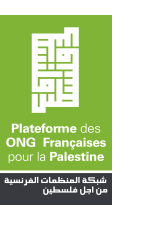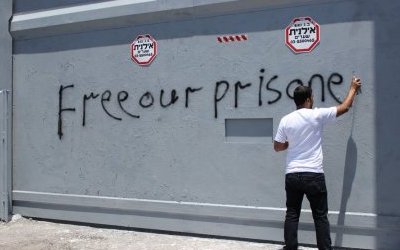


Traitement médical forcé de Mohammed Al-Qiq
Paris, 3 February 2016
Dear Sir,
The undersigned NGOs express their concern about the forced treatment inflicted upon Palestinian journalist Mohammed al-Qiq by Afula hospital’s medical staff.
Following his arrest at home on 21 November 2015, Mohammed al-Qiq was tortured and interrogated for two weeks by the Israel Security Agency. His interrogators kept him tied up for hours in painful positions, threatened him with sexual assault, insulted him and continuously screamed at him.
On his fourth day of interrogation, Mohammed al-Qiq went on hunger strike.
On December 17th, military authorities ordered his administrative detention without charge or trial for a period of six months renewable indefinitely, on the basis of secret evidence to which neither he nor his lawyer has access. Mohammed al-Qiq filed an appeal against that decision. He saw his lawyer for the first time on December 24th, when he was presented before the military judge in a wheelchair.
On December 30th, as Mohammed al-Qiq’s health was deteriorating, he was transferred from Ramle prison to Afula hospital. There, the prison guards tied him to his bed and helped medical staff to treat him by forcibly placing an IV. Mr. Al-Qiq had yet clearly notified his refusal to receive treatment. This forced treatment was approved by the hospital’s medical ethics committee even though it is considered as a form of cruel, inhuman and degrading treatment by the United Nations Special Rapporteur on torture.
The World Medical Association (WMA) aims at establishing and promoting the highest standards in medical ethics and care among doctors. To this end it has adopted the Malta Declaration which recalls in its preamble that « The principle of beneficence urges physicians to resuscitate them but respect for individual autonomy restrains physicians from intervening when a valid and informed refusal has been made. »
We welcome the fact that the Israel Medical Association (IMA) has endorsed this commitment and recalled it in his Practitioners Guide on the treatment of detainees and prisoners on hunger strike, published in 2014.
However, we regret that the IMA hasn’t made any public statement condemning the forced treatment of Mohammed al-Qiq. This act is yet even more reprehensible that it is a violation of both the Convention against Torture of the United Nations and medical ethics as envisioned by the Malta Declaration.
The silence of the IMA might be interpreted by the Israeli authorities as a permission. We fear that the treatment or forced feeding of detainees on hunger strike will spread as prompted by the force-feeding law adopted by the Knesset in July 2015.
In these circumstances, we urge you to publicly condemn Mohammed al-Qiq’s forced treatment by Israeli doctors.
Sincerely Yours,
Jean-Etienne de Linares, General Delegate of Action by Christian for the Abolition of Torture
Tawfiq Tahani, President of Association France-Palestine Solidarity
Geneviève Garrigos, President of Amnesty International-France
Françoise Dumont, President of the French Human Rights League
Claude Léostic, President of the French Platform of NGOs for Palestine
Partager / imprimer




Rechercher par thématique
Prisonniers palestiniens Détention administrative Alimentation forcée
Rechercher par type de ressources
courrier
Articles associés
 21 octobre 2024
21 octobre 2024[Edition spéciale] Gaza, une guerre de l’information Analyses politiques et géopolitiques Promotion de la paix et de la non violence La question palestinienne en France Entreprises et droits humains Cour Pénale Internationale Solidarité internationale Défenseur.e des droits de l’Homme Torture et mauvais traitements Histoire/analyse politique Economie et développement Détention administrative Prisonniers palestiniens Positions officielles de la France Aide internationale Liberté d’expression Diplomatie Impunité Crime de guerre Colonisation Bande de Gaza Commerce solidaire Hamas Droit international Apartheid Médias Journalisme
 14 août 2024
14 août 2024Les prisonniers, les chiffres-clés 2024 Prisonniers palestiniens Détention administrative
 18 avril 2024
18 avril 2024Hôpital Al-Shifa, ventes militaires françaises et demande de cessez-le-feu Analyses politiques et géopolitiques La question palestinienne en France Torture et mauvais traitements Histoire/analyse politique Société (Palestine/Israël) Solidarité internationale Jérusalem Armement Prisonniers palestiniens Autorité palestinienne Liberté d’expression Climat/environnement Droit international Occupation/annexion Violence des colons Politique française Etat de Palestine Vallée du Jourdain Enfance/jeunesse Crime de guerre Société civile Bande de Gaza Nations unies Destructions UE/Palestine Agriculture Colonisation Développement Aide internationale Apartheid UE/Israël Eau Santé Hamas Guerre
Campagne en cours
Dernières publications
 4 novembre 2024
Lettre ouverte au Ministre des Affaires étrangères - Présence du ministre israélien Bezalel Smotrich à Paris le 13 novembre
Colonisation
Droit international
4 novembre 2024
Lettre ouverte au Ministre des Affaires étrangères - Présence du ministre israélien Bezalel Smotrich à Paris le 13 novembre
Colonisation
Droit international
 24 octobre 2024
Appel à un cessez-le-feu à Gaza, au Liban et en Israël et à la fin de l’impunité dans un contexte de catastrophe humanitaire croissante et d’escalade des conflits régionaux
Bande de Gaza
Impunité
24 octobre 2024
Appel à un cessez-le-feu à Gaza, au Liban et en Israël et à la fin de l’impunité dans un contexte de catastrophe humanitaire croissante et d’escalade des conflits régionaux
Bande de Gaza
Impunité
> Toutes les publications






